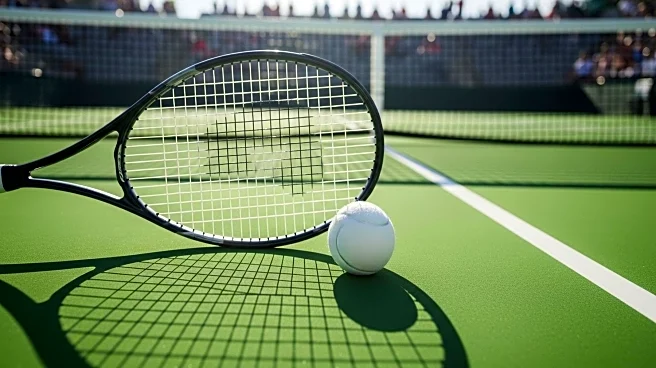What's Happening?
Coco Gauff, the top-ranked American tennis player, is facing significant pressure at the US Open following a major change in her coaching team. Gauff recently replaced her coaching staff with Gavin MacMillan, a biomechanics specialist known for his work with Aryna Sabalenka, to address issues with her serve. This decision has added stress during the tournament, as evidenced by her emotional win against Donna Vekic. Tennis legend Lindsay Davenport has urged fans to ease the pressure on Gauff, highlighting the challenges of making technical adjustments during such a high-stakes event. Despite the difficulties, Gauff continues to compete, showcasing resilience and determination.
Why It's Important?
The situation with Coco Gauff is significant as it highlights the intense pressure young athletes face, especially when they are seen as national hopes in major tournaments. Gauff's decision to change her coaching team mid-tournament underscores the challenges of balancing performance expectations with personal development. Her experience is a reminder of the mental and emotional demands placed on athletes, which can impact their performance and career trajectory. The support from figures like Lindsay Davenport emphasizes the need for understanding and patience from fans and the media, which can influence public perception and the athlete's confidence.
What's Next?
As Coco Gauff continues her journey in the US Open, the focus will be on her ability to adapt to the changes in her game and manage the pressure. The outcome of her matches will likely influence her future decisions regarding coaching and technique adjustments. Stakeholders, including fans, sponsors, and the tennis community, will be watching closely to see how Gauff navigates these challenges. Her performance could set a precedent for other athletes facing similar situations, potentially leading to discussions on athlete support and coaching strategies.
Beyond the Headlines
The broader implications of Coco Gauff's situation extend to the cultural and ethical dimensions of sports. It raises questions about the expectations placed on young athletes and the role of coaching in their development. The emotional toll of high-pressure environments can affect athletes' mental health, prompting discussions on the importance of psychological support in sports. Gauff's experience may inspire changes in how athletes are supported during transitions, emphasizing the need for a holistic approach to athlete development.











